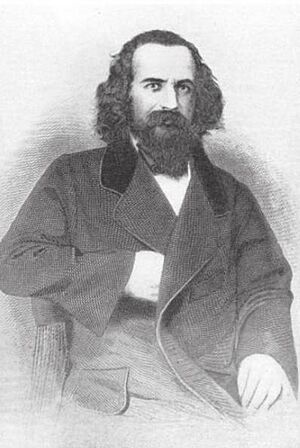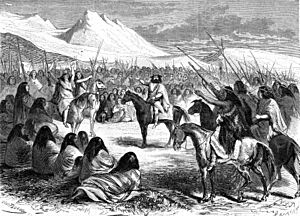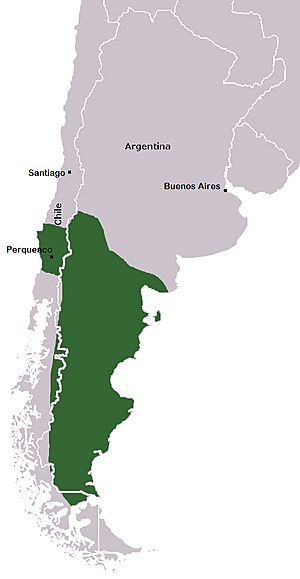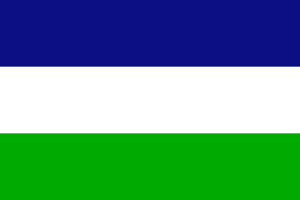Orélie-Antoine de Tounens facts for kids
Quick facts for kids Orélie-Antoine de Tounens |
|
|---|---|
 |
|
| King of Araucania and Patagonia self-proclaimed |
|
| Reign | 17 November 1860 – 17 September 1878 |
| Predecessor | Position created |
| Successor | Achille Laviarde |
| Born | 12 May 1825 Chourgnac, France |
| Died | 17 September 1878 (aged 53) Tourtoirac, France |
| Father | Jean Tounens |
| Mother | Catherine Jardon |
| Occupation | Lawyer |
Orélie-Antoine de Tounens (born Antoine Tounens) (12 May 1825 – 17 September 1878) was a French lawyer and a big adventurer. He made a bold claim in 1860: he said that the lands of Araucanía and Patagonia were independent. Even more, he declared himself their King! He called himself Orélie-Antoine I.
In 1862, the Chilean army arrested him. A court in Santiago said he was not mentally well. He was then sent back to France. He tried three more times to return to his "kingdom" but never succeeded. Orélie-Antoine de Tounens died without much money in France in 1878.
Contents
Becoming King of Araucanía
In 1858, Antoine de Tounens was a lawyer in France. He read a book called La Araucana by Alonso de Ercilla. This book was about the Mapuche people in a region called Araucanía. It inspired him to travel there and try to become their king.
He sailed to Chile and spent two years learning Spanish. Then, he traveled south to the Bio-Bio area. There, he met some loncos, who were leaders of the Mapuche tribes. He promised them weapons and help from France. He said this would help them stay independent from Chile. The Mapuche leaders then chose him as their Great Toqui, which means Supreme Chieftain.
Declaring a New Kingdom
On November 17 and November 20, 1860, Antoine de Tounens made two official statements. In these, he declared himself King of Araucanía and Patagonia. He took the name Orélie-Antoine I.
He wrote in his memories that he took the title of king. He said he set up a government where the king's power would pass down in his family. He believed the Mapuche people were free to choose him as their ruler. He also felt he was free to accept this role.
Chile's Reaction to the Kingdom
De Tounens sent copies of his kingdom's rules to newspapers in Chile. One newspaper, El Mercurio, even printed part of it. He then waited for the Chilean government to respond, but they ignored him.
He also tried to get the French government to support his idea. However, the French consul (a government official) thought de Tounens was not mentally well. De Tounens then went back to Araucanía. Many Mapuche tribes were getting ready to fight the Chilean Army. The Chilean army was trying to take over their lands in what was called the occupation of Araucanía.
The idea of this new kingdom led to more fighting. The Chilean president, José Joaquín Pérez, told his army commander, Cornelio Saavedra Rodríguez, to invade Araucanía.
Capture and Return to France
Antoine de Tounens's servant, Juan Bautista Rosales, told the Chilean authorities where he was. On January 5, 1862, the Chilean army captured de Tounens. He was put in prison. On September 2, 1862, a court in Santiago declared him not mentally well. He was then sent back to France on October 28, 1862.
Later Attempts to Return
De Tounens wrote about his adventures in 1863. In 1869, he tried to go back to Araucanía. He traveled through Buenos Aires. The Mapuche people were surprised to see him. The Chileans had told them he was dead! De Tounens tried to get his "kingdom" organized again. This caught the attention of the Chilean authorities once more. A Chilean army colonel even offered a reward for his capture. But the Mapuche decided to protect their unusual ally.
In 1871, he did not have enough money. So, he had to go back to France. There, he wrote another book about his experiences. He also started a newspaper about Araucanía called La Corona de Acero ("The Steel Crown"). In 1872, he said he was looking for a wife to have a child who could take over his "throne."
In 1874, he tried to return to his kingdom again. This time, he had some weapons and ammunition. He got them with a little help from some business people in Europe. He used a fake passport because he was not allowed in Chile. But as soon as he landed in Bahía Blanca in Argentina, he was recognized. He was quickly sent back to France.
De Tounens tried one more time to return in 1876. However, local people robbed him on his way to Patagonia. They handed him over to the Chilean authorities. He also became very sick and needed an operation. His health was too poor to continue his journey, so he had to go back to France.
Antoine de Tounens died without much money on September 17, 1878, in Tourtoirac, France.
After His Death
Orélie-Antoine de Tounens had no children. But since his death in 1878, some French people have claimed to be the next rulers of Araucanía and Patagonia. These people are not related to him. It is not clear if the Mapuche people know about these claims or if they accept them.
These people who claim to be kings of Araucanía and Patagonia are sometimes called "monarchs of fantasy." This means their claims to a kingdom are not real or recognized by other countries.
See also
- Khalid Sheldrake, a British Muslim who was briefly King of Islamestan, a short-lived Uyghur state during the Warlord Era
 | Janet Taylor Pickett |
 | Synthia Saint James |
 | Howardena Pindell |
 | Faith Ringgold |




